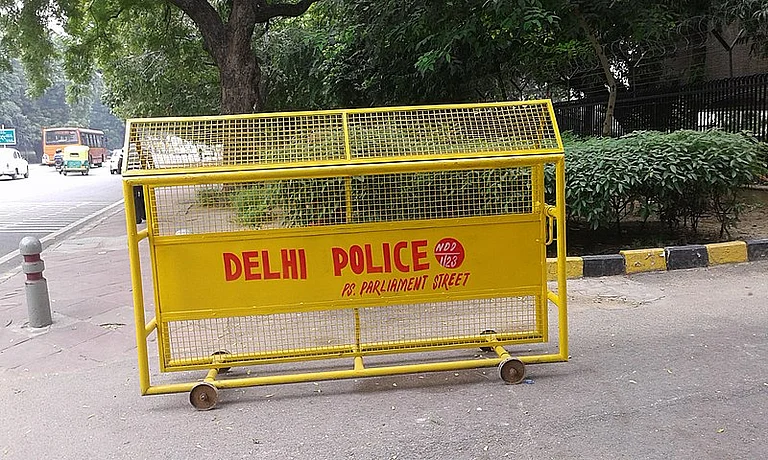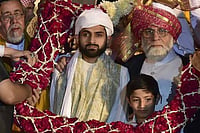The foundational creed for all Muslims is: “There is no god save Allah, and Muhammad is Allah’s prophet”—with the Arabic word Rasul indicating Muhammad’s status. Rasul literally translates as “someone who was sent,” but in common usage in Arabic—and in Islamicate languages such as Urdu and Persian—it means a prophet or apostle. According to the Qur’an, Jesus too is a Rasul of Allah’s Rasul, as are in fact all the prophets of the Old Testament. However, in Islam, Jesus is not God’s Son; though immaculately conceived, he is described only as the son of Maryam or Mary. A useful summation of what the Qur’an tells Muslims about Jesus is found in 4:156–8, where the Jews are chided—“[156] … because they denied and spoke dreadful calumnies of Mary; [157] And for saying: ‘We killed the Christ, Jesus, son of Mary, who was an apostle of God;’ but they neither killed nor crucified him, though it so appeared to them. Those who disagree in the matter are only lost in doubt. They have no knowledge about it other than conjecture, for surely they did not kill him, [158] But God took him to Himself, and God is all-mighty and all-wise.” (Ahmed Ali, Al-Qur’an, Princeton University Press, Princeton, 1984, pp. 93-4.) Christianity, obviously, is six centuries and few decades older than Islam, and every reader of the Qur’an knows that its earliest verses directly and repeatedly, though not exclusively, addressed the Christians of Mecca, reminding them Allah and His Rasul, Jesus, while pointing out their “errors” in belief about the latter.
In other words, Allah was the Arabic word that the people of Mecca—Christians, Jews, and so-called Pagans—were quite familiar with and understood it to represent a singular Supreme Being in Arabic, their shared language. The word, no doubt, had an earlier history, but that is not of concern here. Of importance is the simple fact that a fairly large body of Arabic speaking Christians had been using the word “Allah” for at least a few centuries before the advent of Islam. And that for any Muslim to make a monopolistic claim on the word in the name of Islam would be an act of abysmal ignorance and absolute arrogance. To my limited knowledge, no Muslim, had ever made such a claim in the past.
But these are bad times, reminding us of the words that Yeats made memorable some ninety years ago: “… everywhere // The ceremony of innocence is drowned;// The best lack all conviction, while the worst // Are full of passionate intensity.” And so we have the situation in Malaysia, where some Muslims recently attacked and vandalized nine churches because they did not wish some Malaysian Christians to use “Allah” to refer to their own God.
I have above used the word “some” twice advisedly. According to an Associated Press report of January 9, “Only the Malay-language prayers for indigenous tribes people in the remote states of Sabah and Sarawak use ‘Allah,’ as they have for decades.” And the Catholic weekly, Herald, uses the word only in its Bahasa Malaysia edition. It had been doing so since 1995, but it was not until 2006 that it was warned by the government to stop. And it is only some Malaysian Muslims who, individually or collectively, have been involved in the recent arson and vandalism. (The most recent being an attack on the offices of the lawyer for the Catholic Church.) The many reports in the New York Times barely hinted at that “some-ness.” I had to go online and find some English language Malaysian blogs and newspapers to discover that while the problem was more extensive there was also greater dissent and resistance to the ban among Malaysian Muslims than was reported in the American press, and that any number of prominent academics and journalists had severely criticized the attacks, while bringing to light the issue’s fuller history within the context of Malaysia’s somewhat unique federal political system.
Apparently, there was a local ban and a fatwa to that effect in 1986 in the state of Selangor, which was made into a state law in 1988, and eventually became established in March 2009 as a fully gazetted law in all the constituent states of Malaysia—though not without challenge and opposition from various religious and secular organizations. The ban, in fact, concerned four words, the other three being “Kaabah,” “Solat,” and “Baitullah.” The enacted law prohibited Non-Muslims from using those four words with reference to any occasion or activity that was not Islamic.
It may be recalled that not too long ago there was in Malaysia another brouhaha. A fatwa was issued and nationally confirmed making Yoga a “non-Islamic” practice that Malaysian Muslims were told not to engage in. Earlier there were other controversies—over beauty pageants and also whether it was right for Malaysian Muslims to greet their non-Muslim compatriots on the latter’s religious occasions. I should note that the mufti of Selangor disapproved of the pageants and Yoga but allowed offering greetings to non-Muslims. Indonesia, incidentally, did not prohibit Yoga to its much larger Muslim majority population.
The judicial review sought by the Catholic Church last year came to a conclusion recently. The court’s verdict went in favor of the Church, allowing it to use the word “Allah” in its Malaysian language publications. It was only then that the churches were attacked, including one in the capital, Kuala Lumpur. The response of the Malaysian state so far has been quite satisfactory. It launched an investigation, arrested some alleged culprits, and provided just compensation to the victims. It has also tried to draw the world’s attention to the peculiarities of its federal political system, and asked for more patience and understanding from the critics. At present, the government is making plans to appeal the verdict, and the court has issued a stay on its own order. (As far as I could discover, the verdict exclusively devoted itself to the word “Allah,” and did not overturn the ban on the other three words—nor, it seems, had the Catholic Church asked differently.)
What was certainly heartening for me was to discover the strength of Malaysia’s public sphere through the reports, postings, and analyses available on the web in such journals as the Malay Times and Star and particularly at thenutgraph.com. I learned, for example, about the forum in Kuala Lumpur on January 11 that lasted for four hours and was attended by some 900 people, and where divergent views were peaceably expressed and argued over, with full participation from the audience.
“'Allah' is a specific name, not a general name for God," said Dr Khalif Muammar, a fellow from Universiti Kebangsaan Malaysia (UKM)'s Institute of the Malay World and Civilisation. "The word 'Allah' has been Islamicised since God's revelation to Prophet Muhammad.”
Dr Mohd Farid Mohd Shahran, a Department of Usul al-Din and Comparative Religion lecturer from the International Islamic University Malaysia agreed. "The question is not whether non-Muslims can use 'Allah'," he said. "The question is, is it appropriate and good for them to do so? 'Allah' has been accepted by Malay [Malaysians] and has an established meaning ... [It] has been used [by Muslims] since the time of the Prophet Muhammad…."
Other speakers, however, disagreed and said there was no restriction in the Qur'an or Hadith on the use of "Allah" by non-Muslims.
"There is nothing that states that the word 'Allah' is exclusive to Islam," said Dr Azwira Abdul Aziz, an Islamic lecturer from UKM's Faculty of Islamic Studies. "This issue has not even been debated in the Islamic world. It's almost as if it has been so clearly understood until it does not need to be mentioned."
Azwira added that it was wrong to say that "Allah" should be exclusive to Islam in Malaysia just because it was accepted as the norm by Muslims….
"It is not the word 'Allah' that differentiates Muslims from non-Muslims," said Khalid Samad, PAS Member of Parliament. "It is the understanding of who Allah is and his traits."
A participant also pointed out that when a distinguished Muslim translated the Bible into Malay 150 years ago he used “Allah” to mean “God.” Similarly, it was enlightening for me to learn that in Malaysia it was up to the individual Ruler and religious bodies of each state to accept or reject any edict issued by the National Fatwa Council. (Read more: here) One wishes that reports of such gatherings were also distributed by the New York Times as the reports of the criminal incidents that occasioned them. In contrast, I found that Al-Jazeera on the web had more extensive and nuanced coverage of the issue, both in regular news reports and in the blogs of their correspondent, Teymoor Nabili. (See, for example, here)
I was however still intrigued by the original ban of 1986 that covered three more words besides “Allah,” namely “Kaabah,” i.e. the Ka’ba at Mecca, “Solat,” i.e. Muslim obligatory prayers (in South Asia, more commonly called Namaz), and “Baitullah,” lit. “God’s House,” i.e. a mosque. Surely, I asked, those three words were not likely to be used by any Catholic to refer to his religious institution or practice?
A little more search and a report in the Malaysian Bar concerning confiscation of imported books in January 2008 provided the answer. It mentioned in passing: “[The Deputy Minister] Johari said the ministry did not only target on (sic) Christian books in the operations.” That was perhaps his way of acknowledging the fact that the main target of the original ban in 1986 was the Ahmadi Jama’at. Most likely in imitation of the draconian law put in place by Gen. Ziaul Haq in Pakistan only two years earlier, making it punishable for anyone to directly, or indirectly, pose himself as a Muslim, or call, or refer to, his faith as Islam, or preach or propagate his faith, invite others to accept his faith, “by words, either spoken or written, or by visible representations, or in any manner whatsoever outrag[ing] the religious feelings of Muslims.” The bluster in the final phrase is almost desperate in its viciousness.
As compared to Pakistan, or even India, the Ahmadis in Malaysia form a minuscule minority. They number “only 2,000 at the most” in a population of more than 28 million. They don’t look different from Malay Malaysians, and their identity cards list Islam as their religion. In contrast, in Pakistan, they are listed as non-Muslim, cannot vote as Muslims, and in order to get a passport must sign a declaration that they consider their founder, Mirza Ghulam Ahmad of Qadian, “an impostor nabi.” (For more on Malaysian Ahmadis, see here)
I would love to be corrected but I do not recall much opposition in Pakistan’s public sphere—either in 1974 or ten years later—to the draconian laws and the resultant persecution of the Ahmadis that was often fatal, except by a few brave people who were first at the English monthly Herald and later started Newsline, and who equally boldly reported on the plight of the Hindu and Christian minorities. The Urdu press, as I remember, was in fact vociferous in applauding the law, while remaining silent about its victims. And if any public meeting was organized by university teachers and public intellectuals in those years, it was certainly not reported in major newspapers. In any case, the persecution has continued. As recently as August 2009, there were reports of state supported vandalism at Ahmadi mosques, where the words “Allah” and “Muhammad” were erased or painted over under the supervision of the local police. (Watch: on Youtube) . And only this month an elderly Ahmadi man was gunned down in Ferozewala after he had protested to the police about a big signboard set up at the main roundabout in the city that contained “slogans provoking people against the Ahmadis.” (I think it has now been taken down, chiefly on account of the reporting in the Daily Times.)
But, I’m glad to report, things seem to be changing a bit even in Pakistan. After the incidents in August, an Urdu journalist and TV personality, Mobasher Lucman, conducted a couple of programs that expressed explicit condemnation of the deeds. (See here and here.) Though, to my knowledge, the program did not include any Ahmadi, it was still a big step forward. Similarly, the recent killing in Ferozewala received full and sustained coverage in at least one English language newspaper, the Daily Times, including an editorial titled "Protect Ahmadis"
The Pandora’s Box, so to say, was opened in Pakistan in 1974 by a self-proclaimed Socialist, Z. A Bhutto, when he had the country’s parliament declare the Ahmadis to be a non-Muslim minority. It was the first concession made by the Pakistani state—more accurately, by a desperate and unprincipled politician—to the fanatically sectarian elements in the Sunni Muslim majority of Pakistan. It only encouraged the latter to become bolder and more expansive in their demands. The situation was subsequently made much worse by Gen Ziaul Haq, the original jihadist. The laws remain on the book and fanatics still succeed in manipulating the polity, but after 35 years at least a few voices of sanity and conviction are being raised and also heard. In Pakistan just as in Malaysia. And that is something to be grateful for.
C.M. Naim is Professor Emeritus, University of Chicago
























